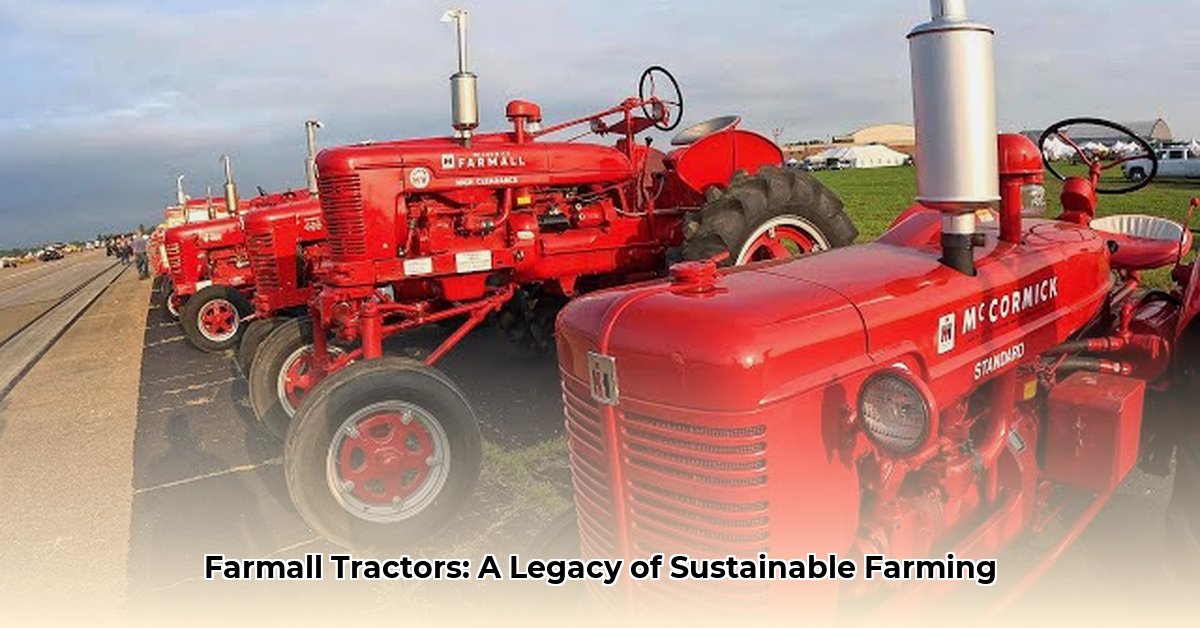
The roar of a Farmall tractor, once a ubiquitous sound across American fields, represents more than just agricultural progress; it symbolizes a shift toward sustainability. From its humble beginnings in the 1920s to its contemporary resurgence, the Farmall's story is deeply intertwined with the evolution of farming practices and the ongoing quest for environmentally responsible agriculture. This narrative explores the Farmall's remarkable journey, highlighting its enduring legacy and its surprising relevance in today's sustainable farming landscape. For a deeper dive into tractor history, check out this tractor history website.
The Farmall's Arrival: A Revolution in the Fields
Imagine a time when horsepower meant literal horses – teams of them, straining under the weight of plows and harrows. The advent of the Farmall tractor in the 1920s irrevocably changed this reality. Its innovative design, combining affordability with remarkable versatility, democratized agricultural power. Suddenly, the small family farm had access to mechanized farming capabilities previously reserved for larger operations. This accessibility revolutionized planting, cultivating, and harvesting, drastically reshaping the American agricultural landscape and impacting global food production. How did this simple machine reshape rural communities, and what were the societal consequences of this profound change?
The Farmall: Simple Design, Powerful Impact
Early Farmall models, such as the iconic F-20, embodied a philosophy of elegant simplicity. Their robust, uncomplicated design ensured reliability and facilitated easy maintenance, a critical factor for farmers who often needed to perform repairs themselves. This simplicity translated into versatility – a single Farmall could handle a range of tasks, from plowing to planting to cultivating, reducing the need for specialized equipment. This characteristic is increasingly attractive to modern farmers focused on simplicity and efficiency. How did this design philosophy contribute to the Farmall’s widespread adoption, and what can modern agricultural design learn from its success?
Ups and Downs: The Farmall's Rollercoaster Ride
The mid-20th century saw the rise of larger farms and more specialized machinery. The relative simplicity of the Farmall, once its strength, became a potential weakness in the face of competition from larger and more technologically advanced tractors. The advent of herbicides, for example, decreased the demand for some of the tasks the Farmall excelled at. Though seemingly destined for obsolescence, this robust machine's story is far from over. What factors led to the decline of Farmall tractors' popularity, and what lessons can be learned from this period of their history?
A Modern Comeback: The Farmall's Unexpected Resurgence
The 21st century has witnessed a surprising resurgence of interest in the Farmall. This renewed appreciation stems from a growing awareness of sustainable agriculture and the recognition of the Farmall's inherent advantages in this context. Smaller farms and those committed to environmentally friendly practices are rediscovering this classic machine's advantages. This unexpected turn highlights the evolving relationship between technology and sustainability. What characteristics make the Farmall particularly well-suited for modern sustainable farming practices?
Sustainable Agriculture and the Farmall: A Perfect Partnership?
The Farmall's resurgence is not coincidental. Its characteristics align remarkably well with the tenets of sustainable agriculture. Its relatively low horsepower translates into reduced fuel consumption and a smaller carbon footprint, vital considerations in today's environmentally conscious farming landscape. Furthermore, its compact size minimizes soil compaction, preserving soil health. The ease of maintenance and repair reduces the need for costly replacement parts and minimizes waste. These characteristics are proving valuable for both economic and environmental reasons. How do these characteristics compare to modern tractors in terms of their impact on the environment?
Key Features of Farmall Tractors for Sustainable Farming
| Feature | Benefit |
|---|---|
| Versatility | Handles diverse tasks, reducing equipment needs and operational costs. |
| Lower Horsepower | Lower fuel consumption, reduces greenhouse gas emissions and operating expenditure. |
| Reduced Soil Compaction | Protects soil health, promotes better water retention and crop yields. |
| Easy Repair & Maintenance | Increased lifespan, minimizes waste and repair costs. |
The Farmall's Lasting Legacy: A Sustainable Future?
The enduring appeal of the Farmall tractor speaks volumes about the importance of simplicity, durability, and adaptability in a rapidly changing world. Its story underscores the potential for older, well-designed technology to play a crucial role in creating a more sustainable agricultural future. It's a testament that true sustainability isn't always about the latest innovations but about finding the right tools for the job, regardless of their age. How can the principles of Farmall's design inform the development of future agricultural technology?
How to Compare Environmental Impact of Farmall vs Modern Tractors in Sustainable Farming
Direct comparison of environmental impacts requires a holistic approach, considering manufacturing, operation, and end-of-life. While modern tractors often boast higher fuel efficiency and precision agriculture capabilities, the Farmall's lower power requirements and ease of repair offer counterbalancing advantages. The "best" choice depends heavily on the specific context of the farm, its scale, and its production goals. Farmers should carefully weigh these factors, factoring in fuel costs, maintenance, repair costs, and environmental impact to make informed purchasing decisions. What quantitative data is needed to facilitate a more complete comparison of these two technologies?
Key Takeaways:
- Farmall tractors offer a compelling alternative within a sustainable farming context.
- Lifecycle analysis is crucial for a fair comparison between Farmall and modern tractors.
- Sustainable farming practices amplify the positive environmental impact of any tractor.